In Japanese, senpai 先輩 means somebody's "senior." That is, someone who has been in an organization for longer than you have. This organization can be a school or school club with students, a workplace with employees and salaryman, etc. Sometimes it can refer to someone who has been doing an activity, like a sport, for longer than you have.
The opposite of senpai would be kouhai 後輩, "junior." For every senpai, there's a kouhai, and vice-versa. Someone who is neither a junior nor a senior is a douhai 同輩. These words are also romanized sempai, kōhai, and dōhai.
Honorific
When the word senpai comes after someone's name, that's called a honorific suffix. It's similar to more common honorific suffixes, like san, chan, and sama. More specifically, senpai works like the word sensei 先生, "teacher," as they're both nouns, titles, honorifics.
- Tanaka-san wa watashi no senpai
田中さんは私の先輩
Tanaka-san is my senpai. - Tanaka-senpai
田中先輩
- Context: Shinomiya Kaguya 四宮かぐや did a favor for her kouhai, Ishigami Yuu 石上優, who tells her:
- Shinomiya-senpai......
四宮先輩・・・・・・ - maji-manji ssu......
まじ卍っす・・・・・・
[You] are maji-manji......- ssu
っす
- ssu
- sore, douiu imi desu ka?
それ どういう意味ですか?
That, [what] does [it] mean? - boku mo wakarimasen......
僕もわかりません・・・・・・
[I] don't know either......- Ishigami isn't a riajuu リア充.
Duties of a Senpai
With great seniority comes great responsibility. The senpai often has duties and responsibilities that a kouhai doesn't have.
The main duty of a senpai is to teach the kouhai the ropes of the job or activity. The layout of the office, school, or organization. Who is responsible for what, introduce the people. Explain how things work.
- Context: the company boss welcomes a new employee, explaining him the basics of the job, and then:
- ato wa wakaranai koto attara senpai ni kiite kure.
後はわからないことあったら先輩に聞いてくれ。
Later if there's something you don't know ask your senpai.- ~te-kure
~てくれ - ~te-kureru
~てくれる
To do [something] for [me].
- ~te-kure
- senpai tte?
先輩って?
Senpai? (who is that?)
Kawaii Kouhai
Some senpai characters want "to try to impress," kakko-tsukeru カッコつける, their kouhai. They'll go an extra length to welcome the kouhai in the organization, often doing things while calling the kouhai their:
- kawaii kouhai
可愛い後輩
Cute junior.- An expression of endearment.
Kouhai Becoming Senpai
A trope that often happens in anime is when a character, normally the protagonist, starts an activity, or working somewhere, even in a school club, thus they're the most kouhai character of all in there. The most inexperienced. The bottom of the bottom. And then, after learning a lot of stuff for the episodes and episodes, or chapter and chapters, a new character enters their group and are placed under their care and supervision.
That is, they gain a kouhai of their own. They are the senpai now. It's a pivotal point of character development, as it conveys the growth of the character: they were on the learning end before, now they're on the teaching end.
Top-right: Tsunemori Akane 常守朱
Bottom-right: Shimotsuki Mika 霜月美佳
Anime: Psycho-Pass, Saiko-Pasu サイコパス (Episodes 1, 22)
- In the first episode of Psycho-Pass, the protagonist Tsunemori Akane 常守朱 joins the law enforcement, welcomed by and placed under the supervision of Ginoza Nobuchika 宜野座伸元, her senpai.
- In the last episode of Psycho-Pass, the scene from the start of the series is recreated, this time with Shimotsuki Mika 霜月美佳 joining the law enforcement, welcomed by and placed under the care of Tsunemori Akane.
- The concept of Tsunemori starting as a kouhai and ending as a senpai symbolizes the growth of her character, developed through the 22 episodes.
Respect Your Senpai
In Japan, the senpai-kouhai 先輩後輩 system is an hierarchical system where the kouhai must respect, and thus obey, the senpai. In simple words, it's thought that the senpai is more "important," erai 偉い, than the kouhai. The senpai is above the kouhai hierarchically.
- Context: it's the attack of an enemy stand! The senpai, Leone Abbacchio レオーネ・アバッキオ, has a plan to deal with it, but the kouhai, Giorno Giovanna ジョルノ・ジョバァーナ, thinks there's a better way. The senpai snaps:
- kono joukyou dewa
この状況では
In this situation, - {senpai de aru} ore no meirei ga zettai da
先輩である俺の命令が絶対だ
The orders of me, [who] {is the senior}, are absolute.- Because I'm your senior, my orders are absolute.
- sore wo kyohi suru tte-n-da na!
それを拒否するってんだな!
[What you're] saying [is you're] denying that, [right?]!- tte-n-da
ってんだ - to-itte-iru-no-da
と言っているのだ
[What you] are saying.
- tte-n-da
- kakugo shitero yo
覚悟してろよ
[Prepare yourself.]- There will be consequences to your insubordination!
- kakugo
覚悟
Resolve. Determination.
- tadashi temee ga iki-nokottara no hanashi daga na
ただしてめーが生き残ったらの話だがな
However, that's [only] if you survive.
In anime, sometimes this senpai-kouhai system is called antiquated, specially by characters that don't like the idea of having to respect their senpai and speaking politely toward them just because they're their senpai.
Senpai Bullies
Some senpai are useless, abusive bullies. They don't help their kouhai at all, instead seeing them as servants, slaves, or worse. The kouhai can't fight back because of social norms. After all, the senpai are "above" them.
In anime, it's a common trope for such senpai bullies to exist, abusing the intrinsic authority and power of their position. They're usually villains or antagonists that must be defeated somehow so their victims can be saved.
Younger Senpai
Since being a senpai has to do with how long you've been somewhere, or done something, rather than how old you are, young senpai become troublesome. That's because you're supposed to respect your elders, but you're also supposed to respect your senpai. The hierarchy becomes unclear: you don't know who's "above" who.
In anime, a recurring trope is an older character having to work with a younger senpai and start hating that fact. Specially when the senpai is some child prodigy; Conversely, you'll eventually find an older character that respects their younger senpai for their skills.
- yoroshiku onegaishimasu, Kageyama-senpai.
よろしくお願いします影山先輩。
[Take care of me,] Kageyama-senpai.- Expression used when meeting someone, or entering care or supervision of someone else, in this case, their senpai.
- e?
え?
Eh? - a... yoroshiku onegaishimasu...
あ・・・よろしくお願いします
(the expression can also be used in response to itself.) - kinchoo shitekita...
キンチョーしてきた・・・
[Now I feel] nervous...
- Relaxed pronunciation of:
- kinchou
緊張
Nervous. Anxious. Tense. - In this case, because he's now burdened with the responsibility of having a kouhai.
"Upperclassman"
In anime, senpai is often translated to "upperclassmen," but that's not what senpai literally means. Children generally start school at the same age, so year age, and grade, school year, naturally matches their seniority.
However, if a character skips grades and starts high school much younger than other students, they're still a senpai despite being younger. Conversely, if they repeat a grade, they can be the senpai of someone who's the same grade as them.
- Context: a character introduced as a 10 year old child prodigy already enrolling high-school shows the stuff she has to deal with.
- nande kodomo ga?
なんで子どもが?
Why is a kid [here]? - *triggered*
- anata wa shin'nyuusei desu ne?
あなたは新入生ですね?
You're a new student, [aren't you]? - e? so sou dakedo
え?そ そうだけど
Eh? [Y-yes, what about it]? - watashi wa Mihama Chiyo, ninensei desu
私は 美浜ちよ, 2年生です
I'm Mihama Chiyo, a second-year student. - Mihama-senpai desu yo
美浜先輩ですよ
[To you, I'm] Mihama-senpai, [got it?] - Mihama... senpai...
美浜・・・先輩・・・
For reference, to say "upperclassman" in Japanese:
- joukyuusei 上級生 (or jōkyūsei)
Higher grade student.
Upperclassman. - doukyuusei 同級生 (or dōkyūsei)
Same grade student.
Classmate. (in the same grade only.) - kakyuusei 下級生 (or kakyūsei)
Lower grade student.
Underclassman.
Kanji
The kanji of senpai 先輩 mean "early" and "comrade." That is, one comrade who's started the activity earlier than you.
- saki 先
Earlier. Before.
By the way, kouhai 後輩 has the same kanji as ato 後, "after, " while douhai 同輩 has the same kanji as "same," onaji 同じ.
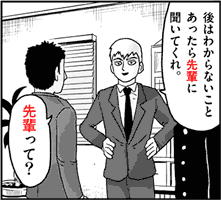
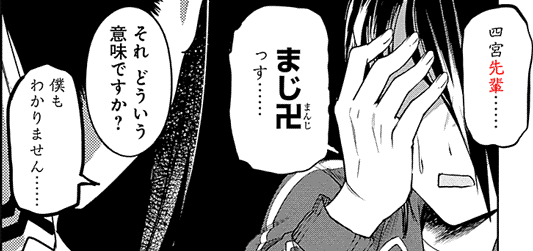
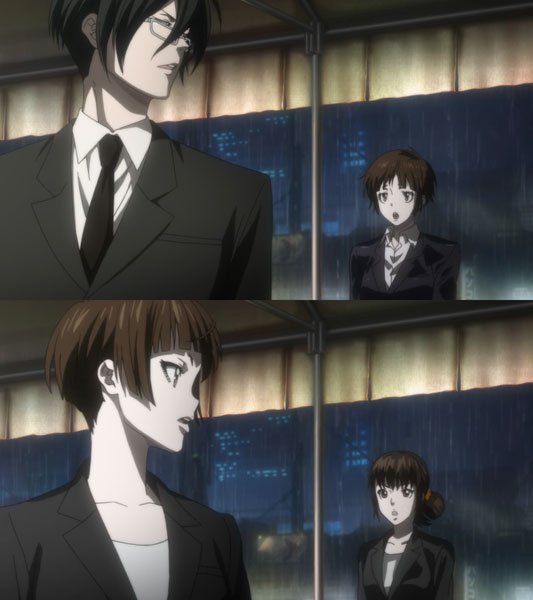
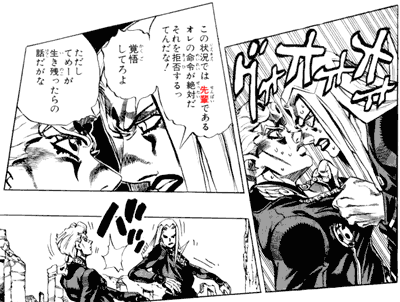
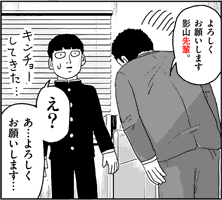
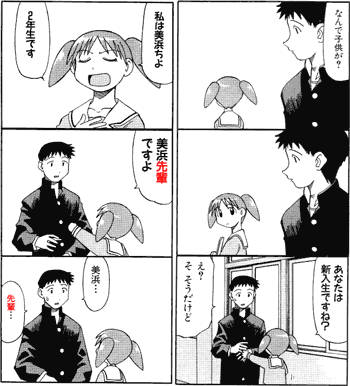
Very good explanation
ReplyDelete